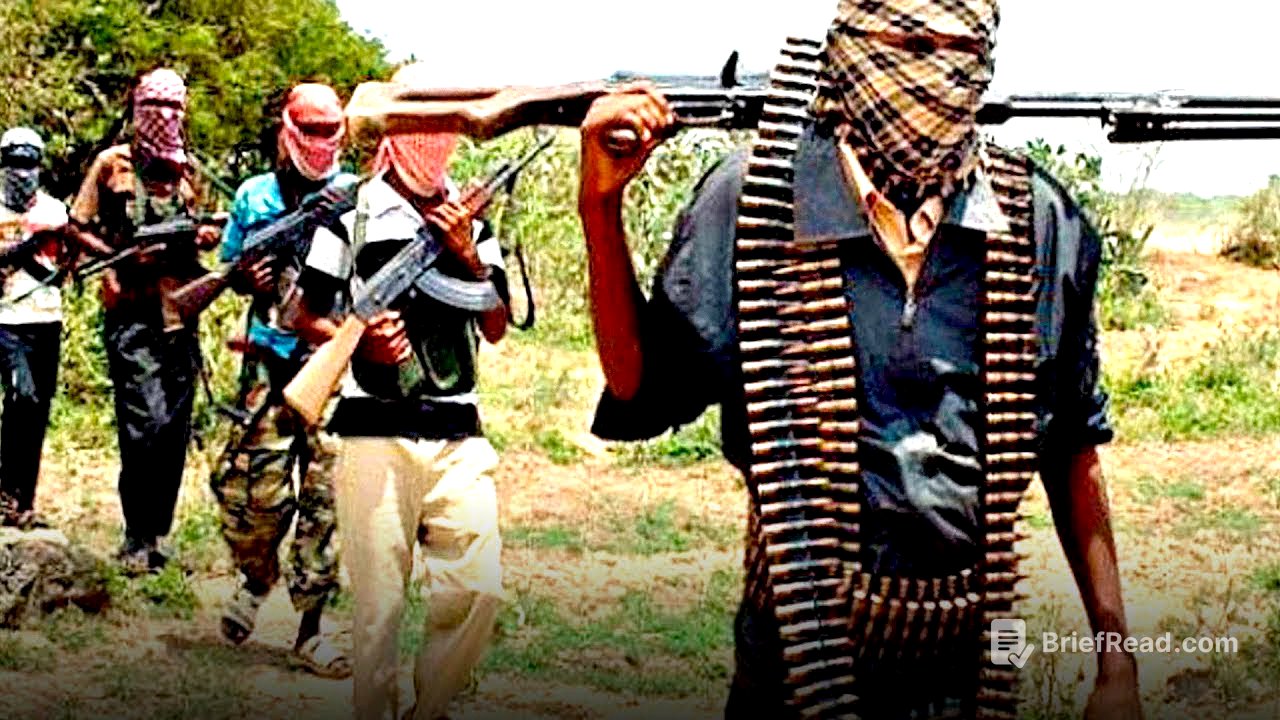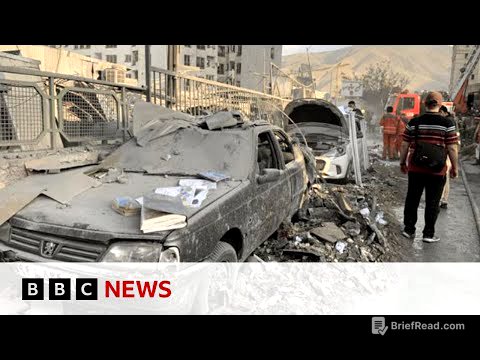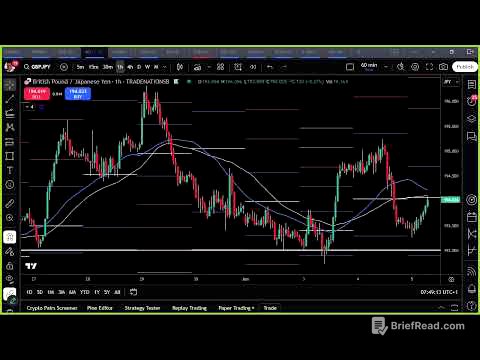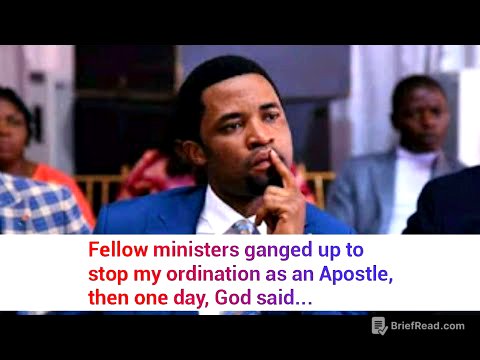TLDR;
This documentary explores the ongoing conflict between Boko Haram and the countries affected by their terror, focusing on the perspectives of soldiers, civilians, and even captured jihadists. It highlights the international efforts to combat Boko Haram, the group's brutal tactics, and the devastating impact on local communities. The film also examines the challenges faced by those living in the shadow of Boko Haram, including the constant threat of suicide attacks and the difficult choices they must make to survive.
- Boko Haram's insurgency and its impact on Nigeria, Cameroon, Niger, and Chad.
- The international coalition and local efforts to combat the group.
- The human cost of the conflict, focusing on civilians and their struggle for survival.
Protecting a Village From Boko Haram [0:02]
In a village on the border between Cameroon and Nigeria, residents face a daily threat from Boko Haram. To defend themselves, they've formed a militia armed with machetes, bows, and arrows, but primarily rely on the Cameroonian Army for protection. Lieutenant Dang commands an isolated outpost in the hills, maintaining constant vigilance to secure the border and prevent Boko Haram raids, aiming to allow the people to live in peace. Soldiers are trained to identify and neutralise threats, with a firm resolve to wipe out Boko Haram.
Boko Haram: The Rise of a Deadly Terrorist Group [1:46]
Boko Haram, comprising tens of thousands of fanatical Islamist fighters, spreads terror across Africa, originating in northern Nigeria, an area marked by poverty and a predominantly Muslim population. Abubakar Shekau, the group's leader, advocates violence and global war in the name of the Quran, as seen in propaganda videos. Shekau and his jihadists employ brutal methods, including beheadings and executions, to terrorise the public. The kidnapping of 276 schoolgirls in Chibok in 2014 brought international attention to Boko Haram's atrocities, sparking global outrage and campaigns like "Bring Back Our Girls".
The Fight Against Boko Haram: An International Effort [4:42]
Boko Haram's attacks have expanded from Nigeria to neighbouring countries like Chad, Niger, and Cameroon, turning parts of these nations into Boko Haram territory. The documentary crew investigates the situation on the ground, following soldiers fighting the religious fanatics and speaking with victims of their abuses. A coalition of African countries, including Niger, Chad, Cameroon, and Nigeria, is actively involved in combating Boko Haram. Western support, including the presence of US and French military personnel, provides intelligence, training, and reconnaissance assistance to the African armies.
Military Strategies and Perspectives on Boko Haram [7:48]
Military leaders from the African coalition meet daily to coordinate operations against Boko Haram, aiming to rid their borders of the group. Colonel Moussa Barmou, leader of the Fifth Military Region, emphasizes the dangerous nature of the task, acknowledging Boko Haram's foothold in Nigeria and their capacity for retaliation. The challenge lies in locating Boko Haram's leader, Abubakar Shekau, who is constantly moving and difficult to capture. Military personnel describe Boko Haram fighters as drug addicts and thugs who violate Islamic principles by killing fellow Muslims and bombing mosques.
On the Front Lines: Defending Against Boko Haram [12:34]
Nigerian soldiers maintain a constant vigil near the border, fearing surprise attacks from Boko Haram. They patrol the area, clearing obstacles and searching for potential ambushes. Recent battles have left corpses of Boko Haram soldiers, some of whom were reportedly on drugs, exhibiting unusual resilience even when injured. The soldiers express their determination to wipe out Boko Haram, viewing their actions as incomprehensible and contrary to religious principles.
Capturing and Confronting Boko Haram Fighters [16:02]
Nigerian soldiers have captured Boko Haram members, who are held as prisoners at Diffa Central Police Station. These prisoners appear harmless, a stark contrast to their violent behaviour on the battlefield. However, the Nigerian Army has faced accusations of violence, with Amnesty International reporting on the execution of 640 prisoners in 2014, some of whom were not Boko Haram soldiers, and instances of arbitrary executions and torture.
Life Under Threat: The Governor's Perspective [18:24]
In Diffa, Niger, the governor's residence, a primary target for Boko Haram, is heavily guarded. The governor questions Boko Haram's true objectives, doubting their desire for an Islamic state given their destructive actions. He asserts that negotiation with criminals is impossible. Meanwhile, soldiers in the military camp engage in evening prayers, and Colonel Moussa Barmou monitors ongoing battles against Islamist militiamen in neighbouring Nigeria.
Recapturing Territory and Western Involvement [19:47]
Nigerian soldiers return from the front lines in Nigeria, displaying ammunition seized from Boko Haram. Images of the battle to recapture a town reveal advanced equipment, including a Russian-made rocket launcher on a Chadian truck, and the presence of Western advisers, possibly employed by a private military corporation funded by the United States. The battle, lasting three hours, results in the Islamists abandoning the village, marking a victory for the coalition forces.
Visiting the Battlefield and Assessing the Aftermath [21:44]
The documentary crew gains permission to visit Nigeria, travelling with French special forces and boarding a Nigerian Army helicopter to reach the theatre of operations. Lieutenant Colonel Toumba reports that his men surprised Boko Haram, finding their food still hot. The conquered village is deserted, but soldiers remain cautious of potential snipers. They patrol the area, searching for hidden threats and expressing their commitment to defending their country and neighbouring nations.
Shifting Tactics and the Threat to Cameroon [25:19]
Faced with sustained attacks from African armies, Boko Haram shifts its tactics, avoiding frontal assaults and focusing on the border between Nigeria and Cameroon. The group aims to establish a caliphate in Africa, enforcing Sharia law. Maroua, in Cameroon, becomes a frequent target, with the army on high alert due to Boko Haram infiltration.
Living in Fear: Suicide Attacks in Maroua [26:47]
In Maroua, Cameroon, police implement strict security measures to protect against increasing suicide attacks, distributing posters with instructions for identifying potential terrorists. These precautions follow a devastating suicide bombing in the city's fabric market in 2015. The local hospital struggles to cope with the influx of survivors. The Christian community feels particularly threatened, with volunteers searching parishioners, including children, for bombs before mass.
Religious Tensions and Community Vigilance [29:54]
During church services in Maroua, watchmen stand guard to prevent attacks. The town, predominantly Muslim, has also been repeatedly targeted by Boko Haram. At the mosque Yahya, vigilance committees frisk worshippers, and women are forbidden from wearing the burqa. Despite these measures, terrorists continue to strike, as seen in a nearby bombing where a child was used as a human bomb, resulting in numerous deaths and injuries.
The Human Cost: Stories of Survival and Loss [32:38]
Survivors of the bombing near the mosque Yahya share their experiences, recounting the carnage and the loss of loved ones. Mustafa Ali, a survivor who lost his eye, recalls the moments before the explosion, discussing football with friends who were killed in the attack. He attributes the violence to brainwashing and a willingness to die for the cause.
Counter-Terrorism Strategies and Training [35:06]
The BIR (Rapid Intervention Brigade) in Cameroon, trained by the Israeli army, leads the fight against Boko Haram. Commander Milate explains that suicide bombers are often children and women who have undergone indoctrination and training in explosives. The BIR adapts to these tactics by using new technology, such as analysing SIM cards and memory sticks for intelligence. They also receive forensic science training and use a computer database to store photos and DNA data.
Kolofata: A Region Under Siege [37:31]
Kolofata, in northern Cameroon near Nigeria, is frequently raided by Boko Haram. In 2014, jihadists burned houses, killed people, and took hostages, including the mayor, Seyni Boukar, who is also a traditional king. After 76 days in captivity, the mayor was released in a prisoner exchange. Since then, he has taken refuge in Garoua, away from Boko Haram.
A King's Captivity: Surviving Boko Haram [38:30]
King Seyni Boukar recounts his abduction by Boko Haram, during which his brother and a holy man were killed. His wife and six children were also captured. The family was taken to the Sambisa Forest in Nigeria, Boko Haram's hideout, where they witnessed executions and heard cries of victory. The king explains that Boko Haram is made up of fighters from Niger, Nigeria, and Cameroon, estimating their numbers at 20,000 to 30,000.
Boko Haram's Ideology and Global Connections [41:36]
King Seyni Boukar describes Boko Haram's ideology, noting their belief that their actions will earn them rewards in paradise. They see themselves as part of a global movement, aligned with groups like ISIS, and believe that the West and Jews have oppressed Islam. They even inquired about converting Chinese hostages to Islam, highlighting their global ambitions.
Military Operations in Kolofata and the Threat of Landmines [42:50]
Military operations in Kolofata have intensified since the king's abduction. Commander Kweni Betus leads a convoy of 50 men to Keraoua, near the Nigerian border, a rear base for Boko Haram attacks. The convoy travels on a high-risk path, where a landmine was detected just days before. The commander shows the location where the landmine was placed, emphasizing the potential damage it could have caused.
Visiting Keraoua: A Village on the Front Line [45:54]
The convoy arrives at Keraoua, a jihadist infiltration point into Cameroon. The village has been the scene of several kamikaze attacks, with the last one occurring ten days prior. Villagers express their hatred for Boko Haram, who they say are criminals and killers who kidnap girls and kill men. They support the security measures implemented to reduce the risk of attacks.
At the Border: Confronting the Enemy [47:51]
The commander and his men approach the border between Cameroon and Nigeria, one of the main entry points for Boko Haram. The other side of the border is not monitored, and Boko Haram could be hiding in the deserted buildings. The commander is warned that gunmen are roaming in the bush and suspects that accomplices in the village may have informed Boko Haram of their presence.
Suspicion and Security Measures in Keraoua [50:03]
The commander implements strict security measures in Keraoua, limiting contact with civilians and searching everyone entering the village for bombs. He expresses suspicion of everyone, emphasizing the need for vigilance. Before dark, the documentary crew leaves the BIR and returns to Maroua.
A Priest's Resolve: Standing Against Fear [52:15]
In Maroua, Father Antonio, one of the last Europeans in the region, remains resolute in the face of fear. He acknowledges the threats he faces as a foreigner representing a culture that Boko Haram considers abominable. Despite the risks, he believes it is crucial to stay with the people during these difficult times. He notes that Boko Haram has sworn allegiance to ISIS and that some factions may be inclined to cease fire, while others call for an intensification of the conflict.









